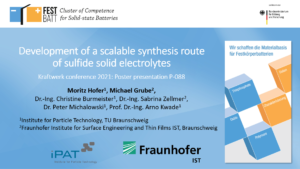Summary:
All-solid-state batteries (ASSB) are recently considered as further development of conventional lithium-ion batteries due to their potentially superior properties [1,2]. In order to produce cells with competitive characteristics, such as high energy density as well as high thermal and mechanical stability, the choice of materials at the beginning of the value-added chain is a main key. Currently, there are still a lot of hurdles for upscaling the synthesis and processing routes of solid electrolytes (SE) wherefore ASSB have been just established at the laboratory scale. Bearing this aspect in mind, the focus of our work was to evaluate and establish new scalable process strategies to produce SE and ASSB.
Thiophosphates have attracted broad interest as SE because of their high Li+ conductivity and compliant mechanical properties [3]. Within this work, their synthesis was performed via high energy ball milling. By systematic variations of the operational parameters, the process-product interactions could be better understood and the process could be optimized in terms of reaction time. Based on the obtained insights, the synthesis procedure will be adapted for the upscaling in suitable mill types such as stirred media mills, which will thus facilitate the industrial production of ASSB.
Additionally, a scalable processing route of the synthesized SE to manufacture composite cathodes was analyzed. The investigated processes involved the comminution of SE, the dry mixing of cathode components (SE, active material, conducting agent), as well as the slurry-based production of the cathode. For the manufacturing of composite electrodes, the mixed powders were dispersed in a binder solution and the slurries directly coated on current collector foils. The microstructure, homogeneity and electrochemical properties of the composite electrodes were characterized in order to evaluate the performance of the process. Furthermore, the processing conditions were varied to analyze process-product relations. In comparison to the slurry-based cathode production, an infiltration process of porous cathodes for conventional lithium ion batteries with sulfide-based varied solution and suspension formulations was also investigated.
We are happy to forward your request / feedback.

